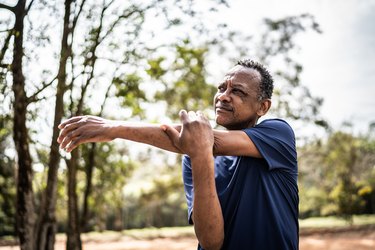
Discovering you have atrial fibrillation (aka AFib or AF) could make you feel some anxiety. After all, this most common type of arrhythmia ups your risk for fatal heart conditions and stroke, per the American Heart Association (AHA).
That is: AFib is a condition to take seriously. But there may be a deeper connection between AFib and anxiety to unpack.
Video of the Day
First, it's possible to confuse AFib for anxiety — or vice versa. A rapid heartbeat is just one of several overlapping symptoms shared by these two conditions. And there may be more of a relationship: Having anxiety may worsen AFib, for instance.
Here's what you need to know, along with tips for managing anxiety when you have AFib.
Defining AFib and Anxiety
Before we dive in, a refresher:
What Is AFib?
"AFib is an erratic heartbeat, where the upper chamber is not communicating effectively with the lower chamber of the heart," explains Jeffrey H. Newman, MD, cardiothoracic surgeon at Delray Medical Center, part of Palm Beach Health Network.
If you have AFib, you can have an excessively high heart rate as well as a low one, and it tends to be irregular, he says. "The heart doesn't like it," Dr. Newman says — the lower chambers, called the ventricles, aren't getting the expected signal from the upper chambers, called the atria.
Along with a rapid, irregular heartbeat, common symptoms of AFib include the following, according to the AHA:
- General fatigue, as well as fatigue when exercising
- Shortness of breath and anxiety
- Feeling dizzy or faint
- Sweating
- Weakness
"It can often be thought of like driving a car at 70 miles an hour but the transmission is stuck in second gear and the engine is knocking," says Ramanak Mitra, MD, PhD, director of electrophysiology at North Shore University Hospital. "This leads to the heart using up more energy than needed and working much harder than is necessary."
Sometimes there are no symptoms of AFib. That's unfortunate, because over the long term, arrhythmia is hard on the heart — it can weaken the heart muscle or lead to the development of heart failure, Dr. Mitra says. "Aside from the mechanical inefficiencies of the heart caused by AFib, one of the biggest hazards is the increased risk of stroke," he says.
The irregular beating from the atria causes blood to pool in the chamber, where it can potentially cause a clot, which can then be pumped out and sent to the brain, where it causes a stroke, according to the AHA.
If you have no symptoms — or ignore them — a stroke may be your first symptom, Dr. Mitra says. Treatment for AFib can involve medications, cardioversion (resetting the heart rhythm) or surgery, according to the Mayo Clinic.
What Is Anxiety?
Most of us have experienced anxiety, those feelings of dread, panic, fear or other similar sensations during big moments, like stepping onto the stage, sitting on a roller coaster as it hurtles upward or when faced with a big decision.
Along with emotions, anxiety can have a physical effect, leading to sweating, dizziness, shortness of breath or an elevated heart rate, according to the U.S. National Library of Medicine (NLM).
While anxiety is normal — again, most if not all of us have felt this at some point or another — anxiety disorders are a type of mental health condition where these sensations don't abate for many months, the level of concern is elevated, panic attacks occur or people have phobias, per the NLM.
Anxiety and AFib have shared symptoms: an elevated heart rate, as well as getting sweaty and short of breath. "It may be difficult to distinguish the two from each other," Dr. Mitra says.
Monitoring — with a doctor-issued wearable monitor, devices such as an Apple watch or by manually checking your pulse for irregularity — can help document a person's heart rhythm when you have symptoms, he says.
To distinguish between the two conditions, it can help to note when symptoms happen, and for how long. AFib episodes often occur out of nowhere (while you're sleeping, for instance, or during an amiable dinner), while anxiety is typically promoted by an emotional trigger.
And, according to the Cleveland Clinic, when heart palpitations, or that sensation of your heart racing or fluttering, last longer than a few minutes or happen frequently, it could be due to AFib or other heart or health conditions rather than anxiety.
Is There a Link Between AFib and Anxiety?
Perhaps there's a bidirectional relationship between stress and atrial fibrillation, according to an August 2022 review in the Journal of the American College of Cardiology: Clinical Electrophysiology. Of course, stress is not the same as anxiety — stress happens in response to an event, such as a delayed flight, while anxiety is a response or reaction to stress. Still, they go hand-in-hand, so the connection is worth noting.
Here's what to know about the potential links between AFib and anxiety:
Having AFib Can Lead to Anxiety
"There is no doubt that the feeling of one's heart racing, shortness of breath or just not feeling well as occurs commonly with AFib can lead to anxiety," Dr. Mitra says.
That is, experiencing the symptoms of AFib can make you feel anxious. In fact, as noted above, the AHA lists anxiety as an AFib symptom.
Anxiety Can Trigger AFib Somewhat
Having anxiety may ramp up AFib symptoms. "Anxiety causes your body to make more adrenaline, which can result in the heart beating even faster in atrial fibrillation, creating a vicious cycle of worsening heart function," Dr. Mitra notes.
What's more: Anxiety in general can lead to poor sleep habits and high blood pressure, Dr. Newman says. "Those two things in and of themselves can lead to what's called paroxysmal AFib [a type of AFib that's brief, lasting under a week], meaning that they can have occasional runs of AFib that self-mitigate," he says.
As people feel less anxious and more calm, the AFib abates.
When you have high blood pressure and aren't well rested, it "stresses the neural-hormonal mechanisms throughout your whole body that can start AFib," Dr. Newman says.
Anxiety Is Hard on Overall Heart Health
The physiological symptoms of anxiety — that heightened blood pressure and poor sleep that Dr. Newman mentioned — are hard on your heart.
For instance, not getting enough sleep is linked with high blood pressure, while insomnia is also linked with high blood pressure along with heart diseases, according to the Centers for Disease Control and Prevention (CDC). Insomnia and lack of sleep also affect the decisions you make while you're awake, which has an effect on your overall health — if you're not well-rested, you might be more likely to skip the workout or opt for picking up takeout rather than cooking yourself a balanced dinner.
Plus, as Dr. Mitra noted, anxiety leads your body to create adrenaline. When you're feeling anxiety, your sympathetic nervous system, aka your fight-or-flight response, is activated, and your heart rate and blood pressure are elevated.
These and other physiological effects of anxiety (as well as other mental health conditions) can lead to calcium buildup in the arteries (putting you at risk for a heart attack) and heart disease, per the CDC.
Still, It’s Unclear if Anxiety Is a Risk Factor for AFib
It's not uncommon for people with AFib to have anxiety. As many as 40 percent of adults with AFib may have depression, anxiety or cognitive impairment, according to a study in the September-October 2020 issue of Archives of Gerontology and Geriatrics. But these two conditions coexisting does not necessarily point to a causal relationship.
In fact, the most recent research available undercuts a notion that having anxiety might increase your risk for developing this arrhythmia.
Dr. Mitra points to the HUNT study — a population-based study from Norway that followed around 37,000 people for seven to nine years. The study, which was published in the International Journal of Cardiology in November 2019, found no association between anxiety and AFib risk. Mild and moderate depression symptoms were associated with increased AFib risk, per the study.
Further, no association between anxiety and the risk of AFib was found in an April 2020 systematic review in Medicine, which looked at 11 cohort studies.
How to Manage Anxiety When You Have AFib
While sometimes anxiety can be a force for good, spurring you to get a project completed by the deadline or memorize lines before giving a speech, it's often an impediment.
"Excessive worry, rumination and fear can inhibit executive functioning that may be required to have success throughout our day," says Mary Tate, LCSW, a psychotherapist and media advisor at Hope for Depression Research Foundation.
Instead of completing a project, anxiety can lead to difficulty focusing, concentrating or making decisions, she says.
Fortunately, many strategies are available to help with stress and anxiety management. These include:
1. Get Informed
If you've been diagnosed with AFib, the serious outcomes can very reasonably leave you feeling concerned or anxious. On the other hand, ignorance can also be anxiety-provoking.
"One very effective approach that I have used for decades in order to allay patient anxiety is to take the time to explain what is happening using terms or analogies that can be understood and explaining why they are feeling certain symptoms and that there are many effective treatment options," Dr. Mitra says.
If you're feeling anxious about your cardiological health, speak to your doctor. But know yourself: If you tend to cling to brief mentions of worst-case scenarios while glossing over more reassuring analyses, this type of conversation may lead to more anxiety — not less — and wouldn't be beneficial for you.
2. Practice Abdominal Breathing
Controling your breathing is the most important strategy for managing stress — you can do it anywhere, it works faster than any anti-anxiety meds and there are no side effects, says licensed mental health counselor Natalie Fraize, LMHC, LPC.
Plus, it's effective: "Deep abdominal breathing is scientifically proven to induce the relaxation response, resulting in lower cortisol levels, lower blood pressure and improved mood," Fraize says.
Fraize outlines the steps to take:
- Imagine you have a balloon in your belly going up to your nose and mouth.
- Next, place your hands on your belly.
- Breathe in slowly through your nose so the air goes deep into your belly. You can imagine feeling the balloon fill; you'll notice your hands rising.
- Once you can't breathe in anymore, let the air out slowly through your mouth. "Imagine letting the air out of a balloon and the way the air whistles as it escapes slowly. Purse your lips so that the air slowly hisses out of your mouth, letting all the air drain from the balloon in your belly." Fraize says.
- Once all the air is gone, repeat from the beginning. Do this for at least two minutes.
Tip
Don’t just do this when you’re feeling stressed. Practice this tactic every evening in bed as you fall asleep, Fraize recommends. “Once you’ve learned that it works, you’ll remember to use it under times of stress,” she says.
3. Challenge Your Negative Thoughts
Frequently, cognitive behavioral therapy (CBT) is helpful for people with anxiety disorders, per the NLM. "CBT is based on helping you recognize and challenge negative thought patterns, feelings and behaviors, leading to better development of coping skills," Tate says.
A therapist specializing in this modality can steer you in the process. But there are also CBT tools you can use at home, she says. These include:
- Progressive muscle relaxation, where you first contract or tense your muscles, then release them
- Journaling to identify thought patterns
- Activity scheduling, which involves scheduling activities you find pleasurable
4. Tap Into Your Senses
"Under the model of dialectical behavioral therapy (DBT), self-soothing pertains to the ability to calm heightened emotional distress by grounding ourselves with physical stimuli," Tate says. To do this, you'll tap into the five senses — like sucking on a peppermint in a moment of stress, she says.
"Sensory input can help calm our nervous system, which allows a momentary break from the symptoms," she says. And, with this break, new thoughts or feelings can form "to address the initial anxiety symptom."
5. Exercise Regularly
Through exercise, you can ease the symptoms of anxiety, and it also may help keep symptoms from returning, according to the Mayo Clinic. Even just a small bit of physical activity (say, 15 minutes of gardening) might help.
A good goal to improve symptoms is 30 minutes of exercise daily for three to five days out of the week, according to the Mayo Clinic.
6. Do Yoga
Yoga is, of course, a type of exercise. And it's a particularly powerful one for people with anxiety: In a randomized clinical trial, researchers found that doing yoga can reduce anxiety for adults with generalized anxiety disorder, per August 2020 findings in JAMA Psychiatry.
However, the study, which compared the effects of three potential treatments — CBT, yoga and stress education — found that CBT is a preferable first-line treatment compared to yoga. Yoga and CBT both outperformed stress education, though.
Yoga is also a boon for heart health: Practicing yoga may help in a variety of ways, lowering cholesterol, blood pressure and heart rate, per Johns Hopkins Medicine.
"Stress reduction, through exercise, yoga or both, has been shown to decrease the risk of AFib," Dr. Mitra notes.
7. Look for Support
Talk to friends and family if you're experiencing stress or anxiety, per the Anxiety & Depression Association of America (ADAA). Your loved ones can offer support and ease your load if you have anxiety due to being overwhelmed, according to the ADAA.
You can also make an appointment with a mental health professional for more support.
8. Make Other Healthy Changes
Other helpful tactics to manage stress include the following, according to the National Institute of Mental Health:
- Cutting down on alcohol and caffeine
- Getting sufficient and consistent sleep (that's seven to nine hours per night for adults)
- Eating healthy meals
9. Ask About Medication
Anxiety medications can also be helpful for some people — although this is strictly a tactic to manage anxiety, and not AFib. "AFib is really a separate issue, and there are other heart-specific medications that would control that," Dr. Newman says.
But if your anxiety symptoms are not eased through the tactics listed above, including seeking help from a mental health professional, medication is another tool that can provide relief for symptoms, Tate says.
- American Heart Association: "What is Atrial Fibrillation?"
- AHA: "What are the Symptoms of Atrial Fibrillation?"
- Mayo Clinic: "Atrial fibrillation"
- U.S. National Library of Medicine: "Anxiety"
- Cleveland Clinic: "Heart Palpitations and Anxiety"
- Journal of the American College of Cardiology: Clinical Electrophysiology: "Atrial Fibrillation and Stress: A 2-Way Street?"
- Centers for Disease Control and Prevention: "How Does Sleep Affect Your Heart Health?"
- CDC: "Heart Disease and Mental Health Disorders"
- Archives of Gerontology and Geriatrics: "Psychosocial and cognitive multimorbidity and health-related quality of life and symptom burden in older adults with atrial fibrillation: The systematic assessment of geriatric elements in atrial fibrillation (SAGE-AF) cohort study"
- International Journal of Cardiology: "Symptoms of anxiety and depression and risk of atrial fibrillation—The HUNT study"
- Medicine: "Relationship between psychological factors and atrial fibrillation"
- Mayo Clinic: "Depression and anxiety: Exercise eases symptoms"
- JAMA Psychiatry: "Efficacy of Yoga vs Cognitive Behavioral Therapy vs Stress Education for the Treatment of Generalized Anxiety Disorder"
- Anxiety & Depression Association of America: "Tips and Strategies to Manage Anxiety and Stress"
- National Institute of Mental Health: "I’m So Stressed Out! Fact Sheet"
- Johns Hopkins Medicine: "The Yoga-Heart Connection"
Is this an emergency? If you are experiencing serious medical symptoms, please see the National Library of Medicine’s list of signs you need emergency medical attention or call 911.











